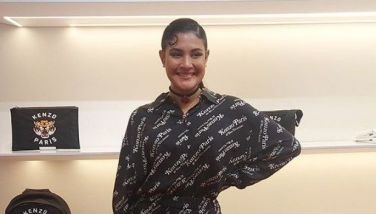Audio Perpetua: Giving the blind equal chance

Blind student performs opera
JAKARTA — Audio Perpetua, a Filipino documentary about giving the visually impaired an equal chance at gainful employment in the field of information technology, is still in production. But its film clips are compelling enough to help it draw strong praises and support, including a few thousand dollars in pledges, to have it completed in order to create public awareness and galvanize corporations to include tech-skilled blind in their workforce.
At Good Pitch Southeast Asia forum held recently in this Indonesian capital, Audio Perpetua was one of only four documentaries whose filmmakers were invited to pitch before leading change makers from the region such as legislators, diplomats, philanthropists, lawyers, educators and artists, who were gathered to support stirring independent documentaries that can be catalysts for change.
The three other documentaries were Sunday Beauty Queen, also from the Philippines; Song For My Children from Indonesia; and Intuition from Singapore, all equally powerful works that also won raves and pledges of monetary and in-kind support.
After watching Audio Perpetua’s inspiring (and amusing) clips and hearing the moving pitch of its director Ivy Universe Baldoza and producer Melanie Entuna, audiences at the prestigious Goethe Institute came to realize that members of the blind community can no longer be confined to being massage therapists or musicians at bus or train terminals.
The docu delves on a group of visually impaired who are being taught to listen to audio files, use the computer keyboard, design web pages and learn the latest software at ATRIEV, the only training center for the blind in the Philippines. (ATRIEV is Adaptive Technology for Rehabilitation, Integration and Empowerment of the Visually Impaired based in Quezon City). Their teacher, Carol Catacutan, is also blind but has proven that technology can open new doors, develop the needed skills and empower persons with disability (PWDs).
At the forum, Catacutan said she believes Audio Perpetua can rouse the Philippine government and the private sector to institutionalize assisted-technology education and employment for the blind.
“It’s not often that we get to see films about PWDs that are not overly sad,” said Marion Numbrado, communications officer for CBM Philippines (formerly Christian Blind Mission). “Audio Perpetua changes the narrative for that because it’s showing PWDs who are empowered and independent.”
Jaime Nemeno, project officer for Unilab Foundation’s Project Inclusion, said the Good Pitch Forum — which was brought to Southeast Asia for the first time by Ford Foundation, Sundance Institute and Britdoc since its successful launch in London in 2008 — gave him a chance to connect with like-minded leaders from the region who believe that PWDs are employable.
Nemeno said Unilab Foundation helps educate employers on how to hire and work with the visually impaired in a professional environment. Since 2013, the foundation has already placed 116 PWDs in 17 companies and is planning to hire more for Unilab itself, he said.
Julia Catherine Nebrija, an assistant general manager at the Metropolitan Manila Development Authority (MMDA), said when Audio Perpetua is ready, it will be screened at MMDA as part of its sensitivity training for employees.
“We support the filmmakers in their pursuit to break down barriers for differently-abled persons and we will continue to find opportunities for the hearing and visually impaired in our agency,” Nebrija said.
Rep. Bernadette Herrera-Dy of Bagong Henerasyon Partylist, who was invited to speak at the forum, said Audio Perpetua can help push the full implementation or improvement of the Magna Carta for PWDs mandating that all corporations, as well as the government, must reserve at least one percent of workforce for PWDs.
Sen. Sonny Angara, meanwhile, noted that the Philippine government is “the biggest violator” of the rights of the disabled with nearly all the structures and facilities of the local and national government lacking in elevators, sidewalks, ramps or railings for PWDs.
Sunday Beauty Queen (SBQ) also got the boost it needed at the Good Pitch Forum. Although the docu has been completed and even won Best Picture at last year’s Metro Manila Film Festival, its director Babyruth Villarama-Gutierrez and producer Chuck Gutierrez said they need financial assistance for their impact goals.
They want the film screened as widely as possible to help change the perception and attitude toward Filipino domestic workers and all migrant workers and thereby reduce cases of abuse and exploitation.
SBQ follows five Filipina house helpers in Hong Kong who dedicate their Sundays to beauty pageants, which they use to regain self-esteem and reclaim their lost dignity.
“The film has a potential to create social change,” Villarama-Gutierrez told the Good Pitch panelists and audiences. “Every time we screen it, more and more people, including relatives of the migrant workers, become knowledgeable and emphatic about their plight… after seeing their stories and struggles.”
Indie filmmaker Chris Cahilig said SBQ is “classic and timeless” and “must be seen year after year” to remind people of the sacrifices and economic contributions of all migrant workers.
Susan Ople of the Blas Ople Policy Center said SBQ is “about making the invisible visible” and “the more people who are able to see this film, the better for humanity.”
“At Ople Center, it’s been an uphill challenge getting government to look at domestic workers not as people you grant favors to or not as people you give shelters to so that they owe more than their lives to the employers. This film deals with that in an inspiring way,” Ople told the forum.
Meantime, Sen. Angara said he will find ways to open a dialogue with Hong Kong legislators in order to create better working conditions for Filipino workers. Among other things, he wants to ask Hong Kong to extend or relax the 14-day rule on foreign domestic workers.
The rule requires migrant workers, whose contracts ended or were terminated, to leave Hong Kong if they cannot find a new employer within 14 days.
Former Hong Kong lawmaker Emily Lau said the Philippines needs to do more to protect its overseas workers.
“My concern is that many of these workers have to pay a lot of money before they can leave their country to work,” Lau pointed out. “We hear about zero placement fee for these workers but the truth is they sometimes have to work eight months or 10 months or even more just to repay their debts which I find very horrendous.”
Lawyers Arni Topico and Pingki Bernabe, both past presidents of the Integrated Bar of the Philippines (IBP) Bulacan Chapter, have offered free legal aid for Filipino overseas workers through the International Pro Bono Alliance they created and which Bernabe currently heads.
“We are building a network of international legal aid lawyers which will be accessible to migrant workers from all over the world,” Bernabe announced at the forum. “They are considered as vulnerable sector and we want to help them.”
Topico added that the alliance is scheduling an international mission to Hong Kong in September to render free legal clinic in partnership with Hong Kong-based lawyers.
Indie producer and businesswoman Sheila Ambray said attending Good Pitch is a life-changing experience where she got to discover how powerful documentaries can ignite social justice campaigns and create global networks to bring about change.
- Latest
- Trending

























 Exclusive
Exclusive


